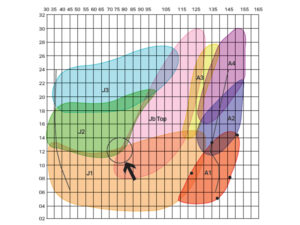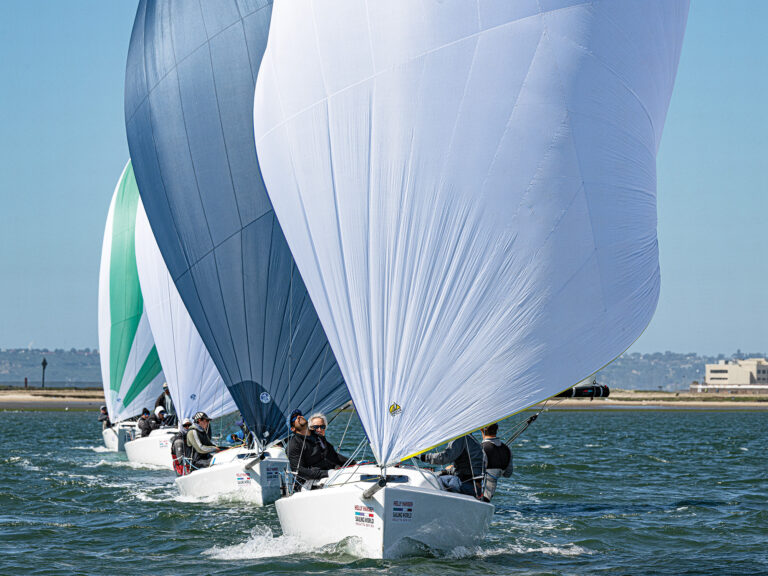From fleet to fleet, and event to event, there’s tremendous variability in the level of compliance with “Sportsmanship and the Rules,” the very basic principle underlying our sport. In some fleets, competitors adhere strictly to the turns penalties set out in Rule 44, while in other fleets compliance is spotty or even nonexistent. At some regattas quite a few protests may be heard, while at other events hardly any protests are ever filed. Consequently, the US SAILING Racing Rules Committees has been studying this issue and discussing why there’s not a higher and more uniform level of rules compliance.
The committee believes this is a serious problem for the sport, and, in an effort to improve compliance, is developing a set of alternative experimental rules. In the coming months, the committee will propose that these experimental rules be added as an appendix in the 2013 US SAILING edition of the racing rules, thereby improving the current rules in the following three ways in order to get at what it believes are the roots of the problem:
›› On-water penalties should more appropriately “fit the crime.”
›› Alternative penalties that are substantially less than disqualification should be available to competitors that come ashore after a race, consult a rulebook or a trusted rules expert and, before any official protest hearing, decide that they broke a rule and should accept a penalty.
›› A shorter, streamlined alternative to a full-fledged protest hearing should be available, particularly when several races are sailed each day.
In an effort to increase the acceptance of penalties and encourage the filing of protests, the racing rules committee drafted two alternative procedures for dispute resolution. The first of these procedures is a system of optional penalties available to competitors that realize they’ve broken a rule. It’s designed to encourage such competitors to take one of the penalties listed (see the box on p. 67). After an incident, the severity of the penalty increases in three “steps” over time.
Experimental Rule A1 would change the on-the-water penalty for breaking a rule of Part 2 to a One-Turn Penalty for most incidents. However, if the incident occurs in the three-length zone around a mark (other than a starting mark), the penalty remains a Two-Turns Penalty. This simple change is already in use in several fleets and clubs. It’s an effort to make the penalty “fit the crime” better than the universal Two-Turns Penalty. If a boat causes injury or serious damage or gains a significant advantage in the race or series, her penalty will still be to retire.
Experimental Rule A2 would provide for a graduating penalty system that applies once a competitor comes ashore after racing. If the competitor reports to the race committee that he or she wishes to take a penalty, the competitor would receive a Scoring Penalty.
If the competitor files the penalty acceptance before the end of protest time, then the penalty would be a 20-percent Scoring Penalty. If the competitor requests the penalty after the protest time limit expires, but before a protest hearing on the incident, then the penalty would be a 30-percent Scoring Penalty.
A second, alternative procedure (in Section B) is an expedited hearing procedure similar to one used successfully in intercollegiate sailing. Rule B1 requires a competitor to notify the race committee at the finish if he or she intends to protest or request redress based on an incident on the water in the racing area. This enables a hearing to get underway sooner.
Rule B2 allows for substantially simplified and shortened protest hearings that can be held at any time— on the water between races, on the dock when boats come in for the day, or in a protest room at the usual time for hearings. The purpose of the expedited hearings is to resolve disagreements about the rules quickly and decisively. Organizers could use one or both of these alternative procedures by simply including rules A1 and A2, or B1 and B2, or all four, in the sailing instructions.
The Racing Rules Committee is currently asking regatta organizers and fleet captains to test either or both of the alternatives. Those who do try them are asked to report whether the changes helped achieve better compliance with the Basic Principle.
The committee is also seeking suggestions for improving these rules or for other approaches that might help improve compliance. So if compliance is an issue in your fleet, I encourage you to try them and send comments and feedback to rules@ussailing.org by May 1.
SPORTSMANSHIP AND THE RULES
Competitors in the sport of sailing are governed by a body of rules that they are expected to follow and enforce. A fundamental principle of sportsmanship is that when competitors break a rule they will promptly take a penalty, which may be to retire.
ALTERNATIVE PROCEDURES FOR DISPUTE RESOLUTION
One or both of these alternative procedures apply only if the rules of Section A, Section B, or both, are included in the sailing instructions.
SECTION A
OPTIONAL PENALTIES
A1 PENALTIES AT THE TIME OF THE INCIDENT
The first two sentences of rule 44.1 are changed to: “A boat may take a One-Turn Penalty when she may have broken a rule of Part 2 or rule 31 while racing. However, when she may have broken a rule of Part 2 while in the zone around a mark other than a starting mark, her penalty shall be a Two-Turns Penalty.”
A2 PENALTIES TAKEN AFTER A RACE
(a) After a race, a boat that may have broken a rule of Part 2 or rule 31 while racing may take a Scoring Penalty. Rules 44.1(a) and (b) apply when such a penalty is taken. Rules 44.3(a) and
(b) are deleted and replaced by: “A boat takes a Scoring Penalty by informing the race committee in writing, identifying the race number and when and where the incident occurred.”
(b) If taken before the protest time limit, the penalty shall be a 20-percent Scoring Penalty. If taken after the protest time limit but before the start of a hearing of a protest involving the incident, the penalty shall be a 30% Scoring Penalty. The penalty shall be calculated as stated in rule 44.3(c).
SECTION B
EXPEDITED HEARINGS
B1 INFORMING THE RACE COMMITTEE
A boat intending to protest or request redress based on an incident in the racing area that she is involved in or sees shall, at the first reasonable opportunity after she finishes, inform the race committee at the finishing line of her intent to protest or request redress and, when applicable, the identity of the protestee.
B2 CHANGES IN HEARING PROCEDURES
This rule applies to all hearings except hearings under rule 69.
(a) If the protest committee is able to assemble the parties to a hearing before the protest or redress time limit, it may begin the hearing and may waive the requirements of rule 61.2 or 62.2.
(b) Rule 63.5 is changed to: “At the beginning of the hearing, if there is no objection, the protest or request is valid and the hearing shall be continued. If an objection is made, the protest committee shall take any evidence . . . [no further change].”
(c) Insert a new sentence after the third sentence of rule 63.6: “However, the committee may limit the number of witnesses, and the time during which parties may present evidence and ask questions.”
(d) The first sentence of rule 65.2 is changed to: “A party to the hearing is entitled to receive the above information in writing, provided she asks the protest committee for it no later than 30 minutes after being informed of the decision or coming ashore following the last race of the day, whichever is later.”
(e) The US SAILING prescriptions to rules 60, 63.2 and 63.4 are deleted.
(f) Change the third sentence of rule 66 to: “A party to the hearing may not ask for a reopening.”









